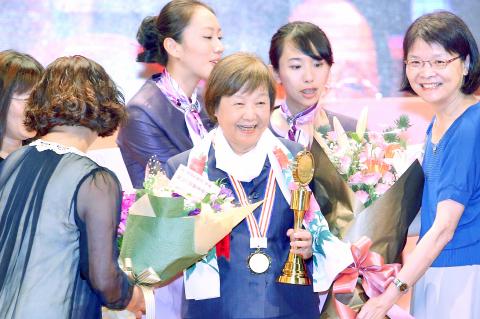Taiwanese should be considered ethnically distinct from Han Chinese, as a majority are more closely related to Aboriginal Austronesians and Pacific islanders, Taiwan’s leading hematologist and medical anthropology researcher said on Saturday.
Marie Lin (林媽利) made the comment at a book launch party for her biography, where colleagues and friends presented her with bouquets and a birthday cake to mark her turning 80 this year.
Decades of research using molecular technology to analyze human DNA and genetic markers had convinced her that most Taiwanese, as descendants of lowland Pingpu Aborigines (平埔族群) and highland Aborigines have mixed blood types, and are quite distinct from the genetic characteristics of the two main ethnic groups in China, the northern and southern Han Chinese.

Photo: CNA
Lin is internationally renowned for her pioneering genetic mapping and ethno-demographic studies of Taiwan’s population, with more than 150 papers to her credit.
“The main Hoklo Taiwanese and Hakka population in this nation have Pingpu and Aboriginal bloodlines in their ancestry from centuries of intermarriage, and the analysis of DNA and genetic markers reflects this new understanding of the close relationship between Taiwanese and Austronesians and Pacific islanders,” she said.
“Through the long history of ethno-cultural evolution on Taiwan, which was isolated from other main population centers, we can consider the result as forming a ‘Taiwanese people group,’ which is distinct from the Han Chinese people,” she said.
Genetic contributions from the Pingpu and Aboriginal bloodlines gave Taiwanese the traits of adventurous ambition, open hospitality to outsiders and a positive, sunny disposition in general, she said.
Lin has served as director of transfusion medicine and molecular anthropology at Mackay Memorial Hospital in Taipei — where she set up the nation’s first blood bank — since 2000, and been a professor at National Taiwan University’s Institute of Forensic Medicine since 2004.

Taiwanese can file complaints with the Tourism Administration to report travel agencies if their activities caused termination of a person’s citizenship, Mainland Affairs Council Minister Chiu Chui-cheng (邱垂正) said yesterday, after a podcaster highlighted a case in which a person’s citizenship was canceled for receiving a single-use Chinese passport to enter Russia. The council is aware of incidents in which people who signed up through Chinese travel agencies for tours of Russia were told they could obtain Russian visas and fast-track border clearance, Chiu told reporters on the sidelines of an event in Taipei. However, the travel agencies actually applied

Japanese footwear brand Onitsuka Tiger today issued a public apology and said it has suspended an employee amid allegations that the staff member discriminated against a Vietnamese customer at its Taipei 101 store. Posting on the social media platform Threads yesterday, a user said that an employee at the store said that “those shoes are very expensive” when her friend, who is a migrant worker from Vietnam, asked for assistance. The employee then ignored her until she asked again, to which she replied: "We don't have a size 37." The post had amassed nearly 26,000 likes and 916 comments as of this

New measures aimed at making Taiwan more attractive to foreign professionals came into effect this month, the National Development Council said yesterday. Among the changes, international students at Taiwanese universities would be able to work in Taiwan without a work permit in the two years after they graduate, explainer materials provided by the council said. In addition, foreign nationals who graduated from one of the world’s top 200 universities within the past five years can also apply for a two-year open work permit. Previously, those graduates would have needed to apply for a work permit using point-based criteria or have a Taiwanese company

The Shilin District Prosecutors’ Office yesterday indicted two Taiwanese and issued a wanted notice for Pete Liu (劉作虎), founder of Shenzhen-based smartphone manufacturer OnePlus Technology Co (萬普拉斯科技), for allegedly contravening the Act Governing Relations Between the People of the Taiwan Area and the Mainland Area (臺灣地區與大陸地區人民關係條例) by poaching 70 engineers in Taiwan. Liu allegedly traveled to Taiwan at the end of 2014 and met with a Taiwanese man surnamed Lin (林) to discuss establishing a mobile software research and development (R&D) team in Taiwan, prosecutors said. Without approval from the government, Lin, following Liu’s instructions, recruited more than 70 software